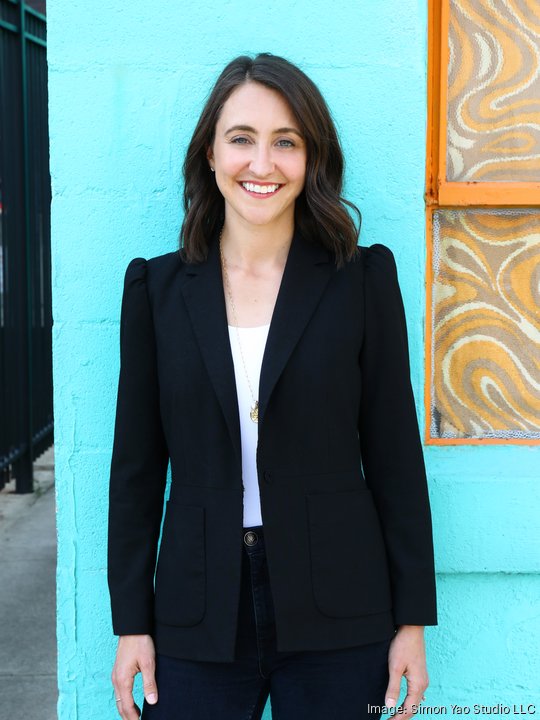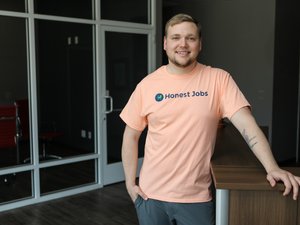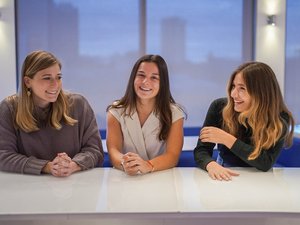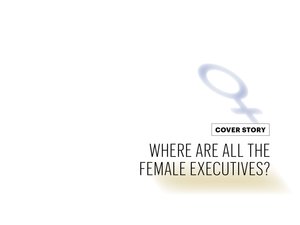
Strongsuit signed its first employer customer when it was a concept, no software yet written. Later a venture fund willingly waited through the co-founder's maternity leave with twins.
The Columbus startup providing tech-enabled personal assistants to dual-income households raised another $3 million in late 2022 as venture funding cooled around the country, bringing the total seed funding to $4.5 million over five years.
Co-founder and CEO Lindsey Michaelides, a mother of four who uses the service herself, said ultimately more women can rise to the C-suite if they can fully focus on family without having to slow or drop out of their careers.
"I want to make work and life something compatible for families, where the load is equally shared and employers are part of the solution," Michaelides said in an interview. "We will have more diverse leaders in business – and our entire society will benefit as a result of that."
Bloomberg Beta, an early-stage fund focused on the future of work, led the latest round with participation from Columbus' Rev1 Ventures. Both were early backers.
Michaelides and co-founder Ashley Lambrix left their jobs as strategy and innovation directors at OhioHealth Corp. in spring 2018 to found the startup. Still an adviser, Lambrix later left operations and is a strategist at Ford Motor Co.
The business is incorporated as Speedwell & Yarrow Inc. The DBA changed to Strongsuit in 2020 in consultation with Columbus branding firm Tenfold.
It was the only Ohio startup in a class of 10 for the Techstars Anywhere accelerator in 2019. Michaelides went through the program while pregnant. As that was wrapping up, a Bloomberg Beta investment lead was touring Rev1's Kinnear Road building and saw a description of the startup in its rented office space.
The executive signed up as a customer. A VC arm of Bloomberg LP, Beta bought memberships for others on the team. Then the firm asked about investing.
"I said, 'I’m going to have these twins, and then I’ll come back and raise this seed round," Michaelides said. "They were the first call I made. They passed us a term sheet right away."
What's resonating with customers and investors alike is the problem Michaelides has observed among co-workers and mentors alike since working at consulting firm McKinsey & Co. in 2012-15.
After she had returned from her first maternity leave, McKinsey even asked Michaelides to research how to keep high-performing women from leaving. In three years there and the next 2 1/2 at OhioHealth, she kept seeing the same pinch points when a quickly ascending employee started a family.
"At my workplaces we were losing talent because of this, people downshifting careers or leaving," she said. "Most were doing it because they felt they had to; they felt they were backed into a corner."
Repeatedly it was the same small things that stacked up to a feeling of inadequacy: missed camp registrations, forgotten birthdays. And even if both parents in a heterosexual couple are working, a disproportionate share of those mental and emotional tasks falls to the woman.
"These are all knowable and solvable things," she said. "They feel totally overwhelming when you’re trying to juggle all the things at once."
She and Lambrix pitched the idea and landed an employer right away. At first the process was intensely manual – which does not make for a tech startup that can grow to a massive scale.
Eventually the software automated many of the tasks and can learn from preferences of a growing user base, but a human always will be in the loop with a family.
The software gathers information about family members, preferences and schedules, and the family is paired with a human assistant. Strongsuit keeps track of birthdays and other reminders, researches best options for camps, family vacations and other activities, and sends recommendations for action. Assistants even can order the labels needed on all belongings at camp.
At first Strongsuit marketed only to employers, but organic inbound traffic, especially during the pandemic, led to a new growth strategy. About 40% of members are direct consumer subscribers. The number of members and revenue amount are not disclosed, but revenue has tripled in each of the last two years.
The company has 15 employees.
The more the user base grows, the more the software can use collective data to automate steps, yet "personalize the automation," Michaelides said.
Greater size also will help bring down the price point from the current $600 a month or $6,000 yearly, she said.
The current target market is dual-income households in which each partner makes more than $100,000 yearly, which is some 10 million families. There's a wait list.
A decade from now, Michaelides wants every major employer offering Strongsuit as a benefit, and access for every working family.
"I hope we are able to create a new category of technology that serves families," she said.







